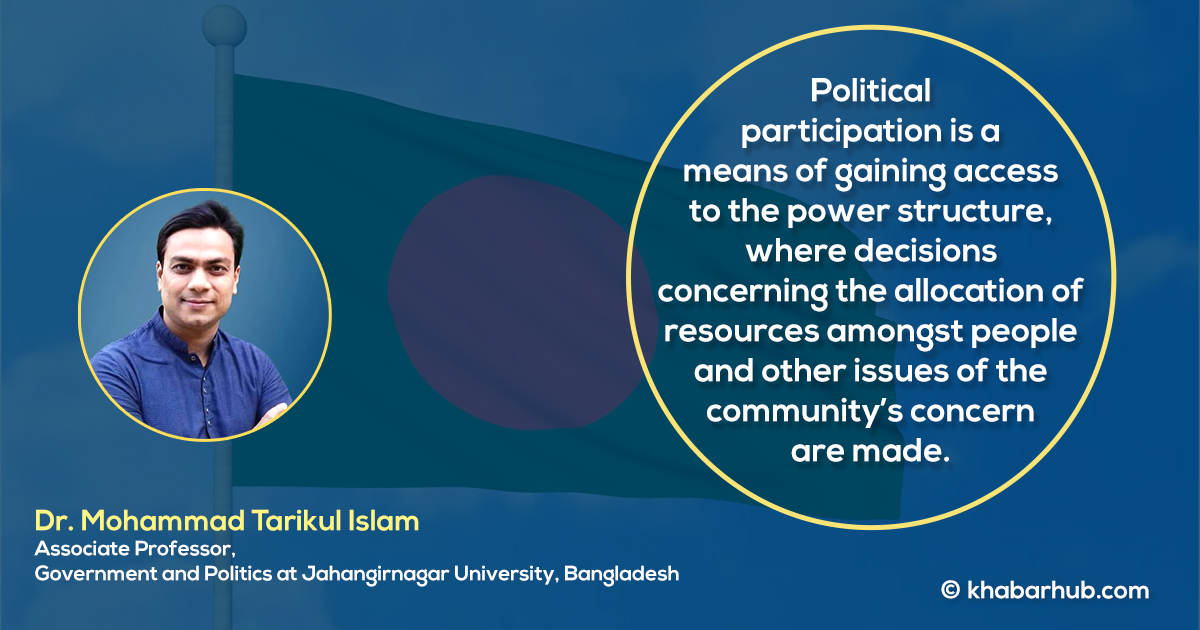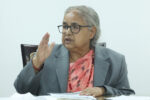The possibility for all citizens to participate in the management of public affairs is at the very heart of democracy.
At the same time, full and equal participation of both women and men in political decision-making provides a balance that more accurately reflects the composition of society.
It also enhances the legitimacy of political processes by making them more democratic and responsive to the concerns and perspectives of all segments of society.
As we know in a democracy the voice of all needs to be heard equally. By being empowered, rural people can take any decision for the development program by using their resources, knowledge and skills.
Democratic value could be achieved only when women are boundless from all forms of oppression. Local government is an important avenue for getting practical experience in participating in politics before moving on to the national arena.
Advocates of decentralization argue that it opens up avenues for women to articulate their interests, to enter arenas of political decision-making, and to advance women’s interests.
The number of women in elective positions of a chairperson and as a member in the Union Parishad was abysmally low, even after three seats were reserved for women candidates.
Throughout history, women are underrepresented in decision-making processes at all governance levels around the world and even they are dominated and marginalized politically, socially, economically, physically, and psychologically by their counterparts.
By responding to local needs, local government plays an influential role in grassroots level development.
Local government means an intra-sovereign governmental unit dealing mainly with local affairs, administered by local authorities and subordinate to the state government.
To ensure women’s equal access and increased participation in political power structures, The Local Government (Union Parishad) Second Amendment Act 1997 of Bangladesh can be seen as a great milestone.
With the help of this amendment, provision declared on direct elections to reserved seats for women in local level elections.
Building a cohesive community requires spirit and enthusiasm among the divisive forces affiliated to various segments and groups to provide for consolidated efforts and cooperation.
It gave the structural framework for women’s participation in political decision-making. It has also provided an opportunity to bring women to the center of local development and to develop new grassroots level leadership.
The number of women in elective positions of a chairperson and as a member in the Union Parishad was abysmally low, even after three seats were reserved for women candidates.
This is because women elected from reserved seats do not get institutional support and are often not included in mainstream activities, and their responsibilities are sometimes not stated clearly.
Even those who are elected as a chairperson or a general member are often ignored during decision-making only because they are women.
It will be impossible to think about the sound development of any developing country like Bangladesh without mainstreaming women in the development process and integrating them equally at the local level and central government. Local government is considered the linchpin of any country’s central government.
Without women’s participation in the political processes, a truly democratic and representative government cannot be established.
Political participation is a means of gaining access to the power structure, where decisions concerning the allocation of resources amongst people and other issues of the community’s concern are made.
Participation in local level government is a critical issue for women mainly because it is one of the most effective instruments to improve the condition of women at the grassroots level.
Amendment 1997 ensured that in elections seats are reserved for women in local level elections, but there are some serious problems in gender balancing both in terms of government policy and in reform agenda.
The Union Parishad is the most popular democratic institution at the grassroots level. Therefore, the state of women’s participation at this level is crucial and deserves special attention to empower them, as participation and empowerment are closely related.
The culture of local government needs to be reformed to ensure that women are treated fairly and equally and to make sure that discrimination against women is not accepted.
At the same time, to perform more effective roles in the development process of the country, gender awareness programs for men and women need to be developed.
For achieving meaningful development in any developing country mainstreaming women through gender-specific policies is a precondition.
Yet it is only recently that this issue has been recognized as such in the context of policy reforms in both administrative and local government areas in Bangladesh.
Recent local government reform in Bangladesh has led to the creation of quota for women in grassroots democratic institutions.
Female members in the Union Parishad (UP, the lowest tier of the local government in Bangladesh), the focal point of local government in the rural areas of Bangladesh, are for the first time elected directly in the reserved seats.
This has opened an avenue for women to participate in the power and decision-making process. Though this participation is in some cases to some extent barred, it provides for maintaining the mosaic of interests in a pluralistic society resulting in social integration.
Under the constitution of local government, the power practices are very much top-down approach where the Chairman is the highly empowered person because of male dominating culture is continuing from the British regime.
Building a cohesive community requires spirit and enthusiasm among the divisive forces affiliated to various segments and groups to provide for consolidated efforts and cooperation.
The institutional structure has to be capable of cohering isolated groups and has to possess the correlative attributes of specialization and coordination.
Many women who decide to participate in elections are forced by the prevailing political culture to spend huge amounts of money.
Women in Bangladesh are mainly economically reliant on their male family members. In Bangladesh, the existing patriarchal system reinforces women’s dependency on men, and men have strong reservations regarding women in leadership and management positions.
Patriarchal values and institutions here do not demonstrate positive and supportive views about women’s leadership.
The presence of women in the national parliament does not reflect the level of political consciousness of the women of the country.
The condition of women’s participation in local-level politics is sometimes worse than it is national politics. To make them familiar with the problems of the local community in general and women’s needs and issues in particular, women’s involvement in the political process at the local level is very much needed.
The activities of the local level women politicians, and their constant contact and interaction with the women of the local community go a long way in raising the political consciousness of women around them.
Institutionalizing the gender perspective is the process of assessing the implications for women and men of any premeditated action, including legislation, policies, or programs, in all areas and at all levels.
It is a strategy for making women’s as well as men’s concerns and experiences a fundamental dimension of the design, implementation, monitoring, and evaluation of policies and programs in all political, economic and societal domains so that women and men benefit equally and inequality is not disseminated.
The ultimate goal is to achieve gender equality. Plans and policies to advance women’s empowerment and/or to attain gender equality have been formulated and serve as the framework against which to mobilize other social sectors.
Without women’s needs and interests being taken into account, without opportunity for them to participate in and influence decision-making, development interventions and planning sustainable results will not come.
The plans may be enforced as ministerial decrees or as legislation. In several countries, the plan for gender equality is part of the overall national development plan, which should hasten the process of incorporating these goals in the different sectoral concerns of government.
Under the constitution of local government, the power practices are very much top-down approach where the Chairman is the highly empowered person because of male dominating culture is continuing from the British regime.
The male member of UP does not like women’s participation in local government because they think women’s capacity not enough and or contemporary as a member of UP.
This perception is contradictory to the constitution of Bangladesh, but regularly practicing this masculine domination.
Therefore, it is we have to believe that women’s economic and educational empowerment can helps them strong participation in local government regimes. Otherwise, they can participate only for participation, nothing else.
UPs should be conferred with meaningful autonomy. Interference from any quarter i.e. from local MP (a member of parliament), Upazila (sub-district) level political leader, MP nominated political persons or local touts must be stopped.
At the same time, UPs should be kept outside the complex bureaucratic procedure as far as possible. Therefore, the necessary reforms of the legal framework should be made.
The elected representatives at the UP level are mostly unaware of the benefits of the participatory development approach.
National efforts to integrate gender equality and women’s empowerment into poverty reduction, democratic governance, crisis prevention and recovery, and environment and sustainable development have been the heart of the development program of the Bangladesh Government in recent years.
A lack of knowledge in this regard on their part may have contributed to their misunderstanding and misconception.
Launching training programs or workshops may help change the mindset of the elected representatives regarding participatory practices in development interventions.
Without women’s needs and interests being taken into account, without opportunity for them to participate in and influence decision-making, development interventions and planning sustainable results will not come.
Yet, having women in these leadership positions is an important step in changing the male-dominated political agenda.
At least they have the opportunity to attend the meetings, interact with officials and take part in important discussions. It also ensures their mobility across the social hierarchy.
National efforts to integrate gender equality and women’s empowerment into poverty reduction, democratic governance, crisis prevention and recovery, and environment and sustainable development have been the heart of the development program of the Bangladesh Government in recent years.
But the political will must continue to be upheld and the spirit of unbiased participation irrespective of gender to the rural development process under the auspicious of local government must be preserved.
(Dr. Mohammad Tarikul Islam is an Associate Professor of the Department of Government and Politics at Jahangirnagar University in Bangladesh. He is the Visiting Scholar of Oxford and Cambridge. Prior to joining the university, Dr. Islam was serving the United Nations for seven years)









Comment